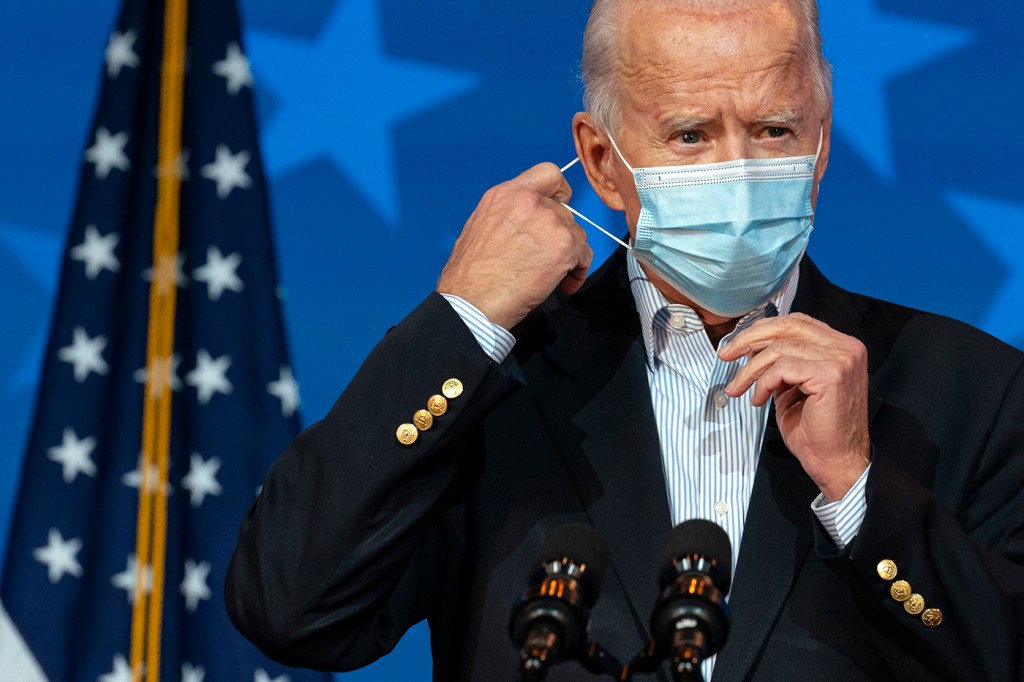Will Biden’s proposed mask mandate legally force people to wear facial coverings?

Even with a raging surge of COVID-19 cases, rising death tolls, and overwhelmed hospitals, Joe Biden probably does not have the legal authority to order people to wear face masks when he officially becomes president in January, according to Northeastern professors.
In August, Biden told reporters that “every governor should mandate mandatory mask wearing” to quell the spread of the coronavirus. But that statement might have been less a legal directive and more of an attempt to deliver consistent messaging and make mask-wearing seem routine, says Wendy Parmet, university distinguished professor of law and director of Northeastern’s Center for Health Policy and Law.
“There’s a lot a president can do, but can he just sign a piece of paper that says, ‘Thou shalt wear masks or else?’ No,” Parmet says.

Northeastern professors Patricia Illingworth (l) and Wendy Parmet (r). “There’s a lot a president can do, but can he just sign a piece of paper that says, ‘Thou shalt wear masks or else?’ No,” Parmet says. Photos by Northeastern University
However, the Centers for Disease Control and Prevention, under a Biden administration, could potentially issue a mandate using the broad authority it has to fight communicable diseases. CDC used that authority recently in issuing an eviction moratorium to prevent millions from being thrown out of their homes and exacerbating the spread of the coronavirus.
The moratorium is currently being litigated, and the outcome may reveal more about whether courts would agree that CDC could mandate mask wearing, Parmet says.
But if Biden tried to get the agency to impose a mask mandate in the absence of congressional action, it would face legal scrutiny, she adds.
“The goal here is not to pass a law. The goal is to be supportive of changing norms. You want to normalize mask-wearing like you normalize brushing your teeth,” she says.
Masks offer a two-way benefit, protecting both the wearer and others, according to new guidance by the CDC. The federal agency encouraged people to wear face coverings earlier in the year in order to prevent infected people from spreading the virus to others.
Public health issues are largely managed at the state level, which is why Biden plans to work with governors and local authorities to make face coverings mandatory, according to his COVID-19 plan.
Only 34 states and the District of Columbia require coverings in public, according to data compiled by AARP, the non-profit formerly known as the American Association of Retired Persons.
But in other parts of the country, some people view a state mandate as an affront to individual rights, explains Patricia Illingworth, professor of philosophy and business at Northeastern.
“From their perspective, they think, ‘The state is demanding that I do something. They have no right to do that,’” she says.
Indeed, residents in Utah recently protested a mask requirement in front of Republican Gov. Gary Herbert’s mansion. Herbert has said the state is “at the breaking point” with higher infections, deaths, and hospitalizations. Meanwhile, Georgia’s governor, Republican Brian Kemp, is giving local jurisdictions leeway to implement mask requirements after he initially opposed them.
Illingworth says states have a moral responsibility to protect the public good, but if they are falling short then the federal government should step in. “Even if the call for a national mask mandate were defeated, the effort to enact one sends a very clear signal that the Biden administration thinks it is critical and urgent that people wear masks,” she says.
“We need to promote a mask mandate from the top down,” she adds. “A lot of people still do not understand that mask wearing isn’t just about them.”
Biden could pursue a number of other options to increase mask use that are well within presidential purview, says Parmet. He could, for example, order federal employees to wear masks on the job, and he can use the power of the office to cajole and coax people into a sense of duty. Another avenue of consistent messaging could come through public campaigns akin to those that warn of the dangers of smoking.
“We have not had a massive public service announcement campaign about the virus as we have had about other issues once upon a time,” says Parmet. “That’s something the new president can easily do.”
For media inquiries, please contact media@northeastern.edu.





